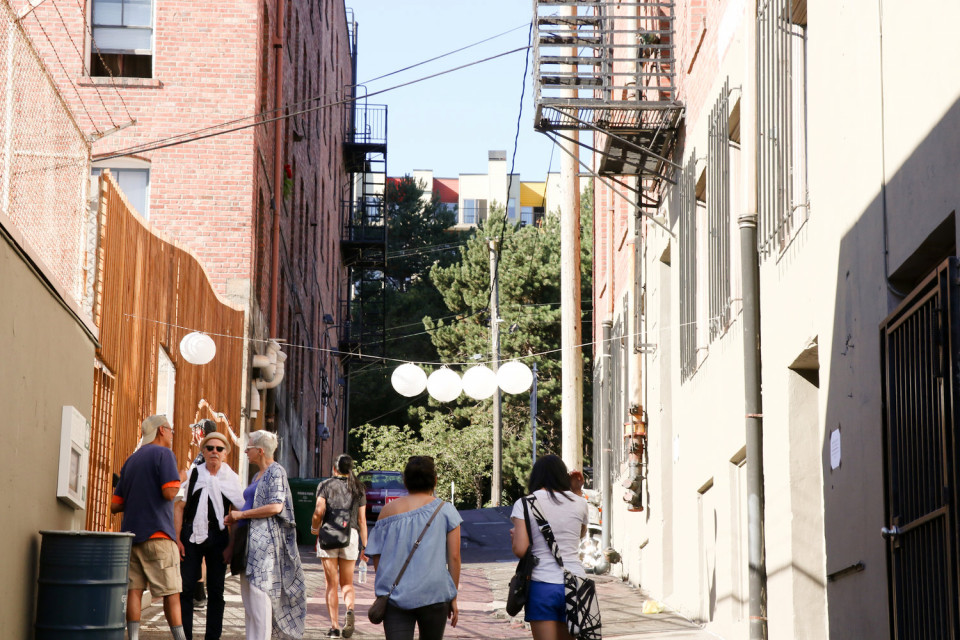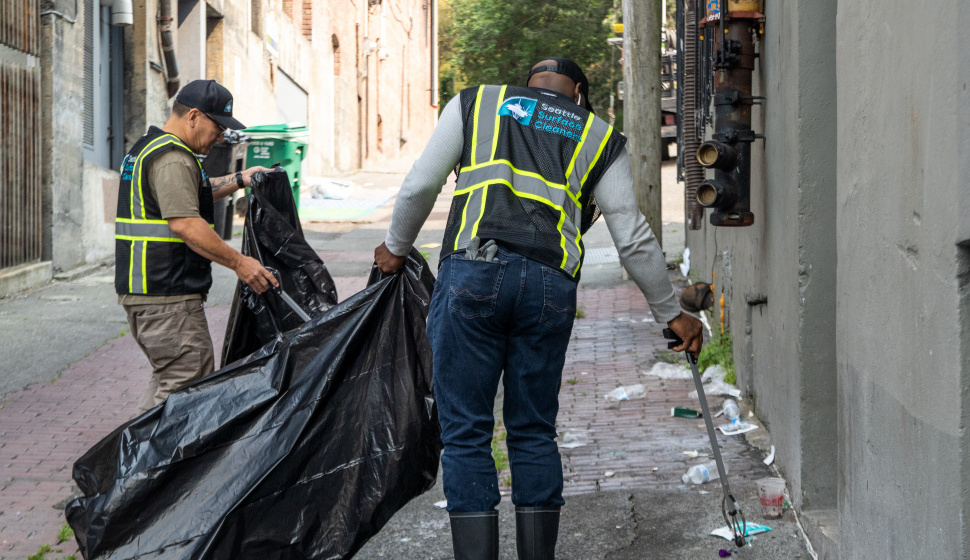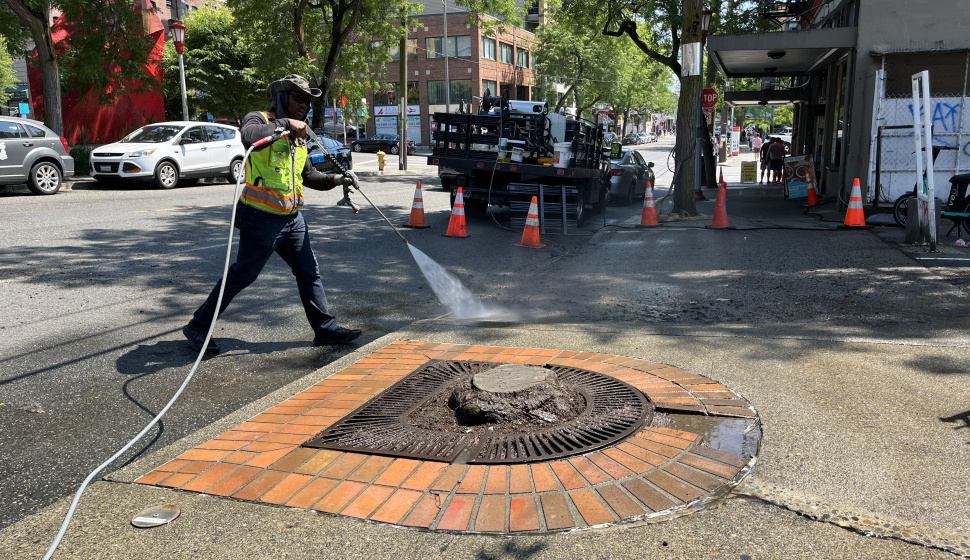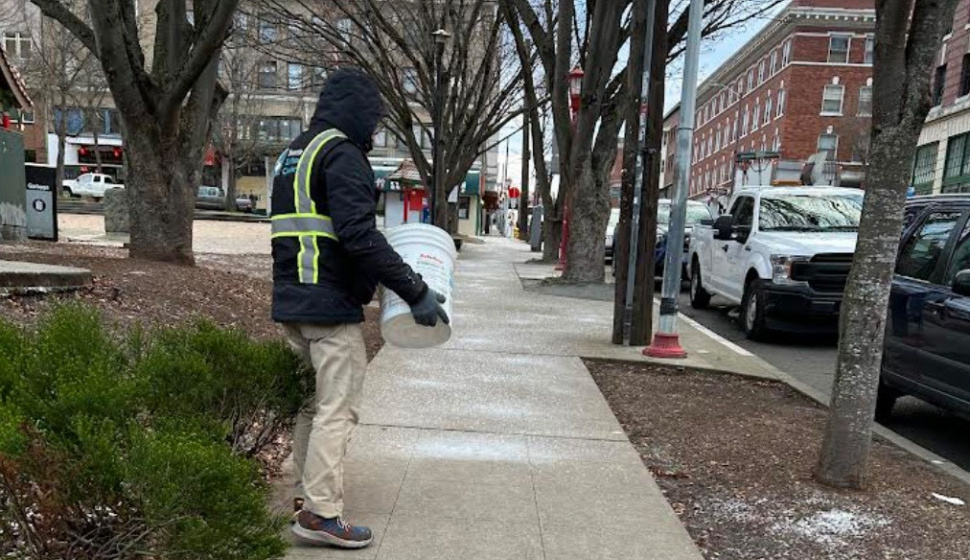clean & green
The Business Improvement Area (BIA) model was created to supplement City services around sanitation with the goal of creating a clean, safe, and welcoming business district. CIDBIA uses a combination of BIA funds and grants to create its sanitation program. Due to the nature of assessment collections and fluctuating grants, services may increase or decrease at any given time.
Total YTD Data of 2023
|
|
Bags of Garbage
|
Bags of Recycle
|
Biohazard Waste
|
Sharps
|
Graffiti (sq. ft.)
|
Overflow (Trashcan + dumpster)
|
Bulky Items
|
Total Hours
|
|
January
|
151
|
94
|
198
|
18
|
1599
|
28
|
29
|
162
|
|
February
|
147
|
133
|
164
|
28
|
1246
|
53
|
61
|
159
|
|
March
|
171
|
186
|
242
|
32
|
1141
|
51
|
58
|
156
|
|
April
|
193
|
182
|
278
|
36
|
2294
|
11
|
22
|
211
|
|
May
|
205
|
177
|
346
|
15
|
1113
|
24
|
43
|
202
|
|
June
|
202
|
153
|
265
|
10
|
1674
|
47
|
10
|
203
|
|
July
|
148
|
38
|
149
|
2
|
1642
|
15
|
11
|
202
|
|
August
|
202
|
60
|
122
|
1
|
1254
|
21
|
7
|
201
|
|
September
|
203
|
103
|
121
|
11
|
1396
|
19
|
9
|
204
|
|
October
|
132
|
119
|
115
|
17
|
1121
|
25
|
11
|
162
|
|
November
|
159
|
126
|
85
|
6
|
1171
|
14
|
48
|
165
|
|
December
|
134
|
181
|
197
|
8
|
944
|
11
|
20
|
162
|
Total Sanitation Data of 2023
|
Bags of Garbage
|
Bags of Recycle
|
Biohazard Waste
|
Sharps
|
Graffiti (sq. ft.)
|
Overflow Trashcans & Dumpsters
|
Bulky Items
|
Total Hours
|
|
2047
|
1552
|
2282
|
184
|
16595
|
319
|
329
|
2189
|
Total Sanitation Data of 2022
|
Bags of Garbage
|
Bags of Recycle
|
Biohazard Waste
|
Sharps
|
Graffiti Pieces
|
Overflow Trashcans & Dumpsters
|
Bulky Items
|
Total Hours
|
|
2690
|
1169
|
1693
|
706
|
3189 + *127.25 hours
|
718
|
477
|
2343
|
*April - June 2022 graffiti abatement was recorded in "hours spent" instead of "graffiti site."
2021 Work Schedule Data
|
|
Total Hours / Month
|
# of Days in Chinatown & Japantown / Week
|
# of Days in Little Saigon / Week
|
|
January
|
145.5 hours
|
3.5
|
1.5
|
|
February*
|
344 hours
|
4.5
|
2.5
|
|
March*
|
340.5 hours
|
4.5
|
2.5
|
|
April*
|
358 hours
|
4.5
|
2.5
|
|
May
|
141 hours
|
3.5
|
1.5
|
|
June
|
147.5 hours
|
3.5
|
1.5
|
|
July*
|
369.5 hours
|
4.5
|
2.5
|
|
August*
|
400 hours
|
4.5
|
2.5
|
|
September*
|
280 hours
|
4.5 / 3.5
|
2.5 / 1.5
|
|
October
|
145 (projected)
|
3.5
|
1.5
|
|
November
|
145 (projected)
|
3.5
|
1.5
|
|
December
|
145 (projected)
|
3.5
|
1.5
|
*additional Clear Cities Initiative (CCI) funding
** through Sept 15
Clean & Green Program Management:
CIDBIA takes the lead for cleaning program for the neighborhood by working with community stakeholders and the City of Seattle to ensure services are adequate, timely, and in compliance with City ordinances.
CIDBIA provides the following services to stakeholders:
- Hire and manage cleaning contractors, Seattle Surface Cleaners
- Intake and follow through on service requests for cleaning contractors
- Work with City of Seattle departments, including Seattle Public Utilities (SPU) and Seattle Department of Transportation (SDOT), to ensure City services are responding to community needs.
- Work with CID businesses and residential property owners to outreach, educate, and provide guidance on City requirements such as the Clear Alley Program.
- Organize community clean-up events and special projects Advocate on behalf of community stakeholders to City of Seattle partners to advance sanitation services in an equitable way.
Cleaning Services to Stakeholders
Chinatown-International District Business Improvement Area contracts with Seattle Surface Cleaners to provide the following services:
- Sweeping of sidewalks from building line to curb
- Topping off public litter cans
- Removal and/or coverup of graffiti that is under 8Ft high on buildings facing the public right of way
- Removal of human and/or animal biohazards from public right of way
- Removal of sharps (needles) from the public right of way
- Seasonal projects such as removal and composting of all leaves in fall and snow shoveling in the winter.
Clear Alley Program (CAP)
Alleys in Chinatown-International District hold a special meaning to stakeholders and has been integral to the growth of the business district. Two of three historic Seattle alleys are in Chinatown-ID. Alleys in the neighborhood have been used for public activation, as important pedestrian throughways, and have active business operations. Currently, alleys are SDOT rights of way, and managed by SPU.
In 2014, as part of a Directors Rule, Chinatown-International District became part of Seattle Public Utilities’ Clear Alley Program. The Clear Alley Program (CAP) is intended to
- Create cleaner, safer business districts
- Reduce the possibility of uncivil behaviors and illegal activities in alleys
- Increase the attractiveness of the alley for public activations and pedestrian use
- Allow for better alley access for business services (deliveries) and possible expansion of commercial and community activity (seating, art, events, etc.)
The Clear Alley Program requires commercial and residential tenants adjacent to alleys to be on the correct level of service. CIDBIA works with businesses and residential property owners to provide outreach and education about the Clear Alley Program.
The program requires:
- All businesses located in a Clear Alley are required to create a CAP account through Waste Management (WM).
- With a CAP account, businesses and residents are able to purchase Waste Management labeled garbage and recycle bags. For more information on setting up an account through Waste Management, click HERE. Translations are available in Chinese, Vietnamese, and Spanish.
- SPU’s contractor Waste Management picks up labeled bags 2 to 3 times a day, 7 days a week.
- The only items that are allowed to be placed in the alleys are:
- WM labeled garbage and recycling bags.
- Labeled compost and recycling carts/totes (32, 60, or 90 gallon)
- Flattened and neatly stacked cardboard boxes
- The following items are NOT allowed in the alleys and are considered illegal dumping, which can result in fines by SPU inspectors:
- Furniture & electronics
- ANY bags that do NOT have Waste Management (WM) labeled on them (including store-bought garbage bags)
- Hazardous liquids and paint
- Construction debris






